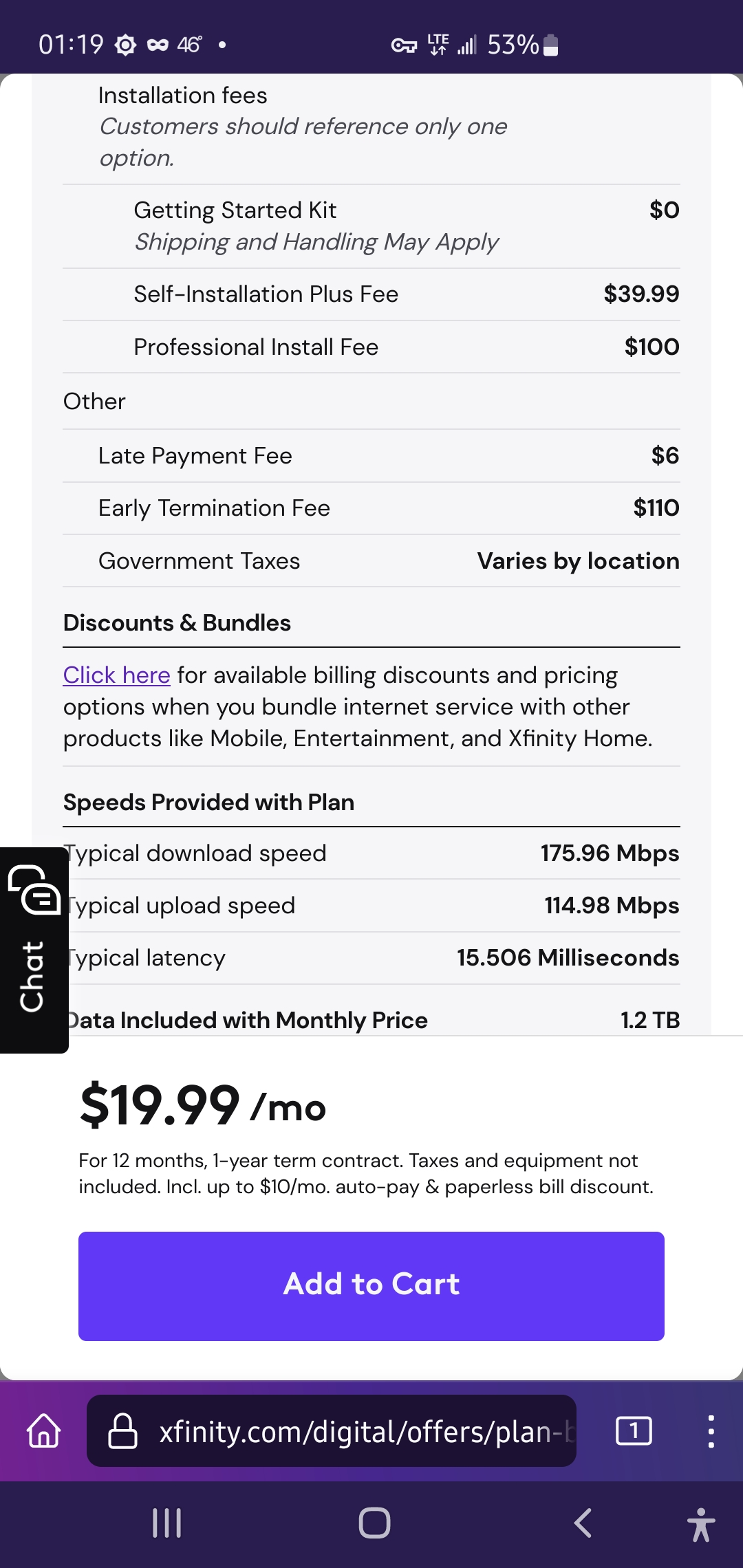Yay so I can see exactly how I’m being fucked over with the only fucking choice in town unless I want dial up.
This is some bullshit if this is in compliance. I had to enter my address for the quote, still doesn’t show what the fucking taxes are, or real price.

I’m guessing they have until the end of the day to be in compliance and they will wait until the very last second.
Ars article was posted on the 10th. This was taken on the 11th.
Well then never mind that, I guess they’re just breaking the law.
What? The Corportations that stole billions of dollars given to them to get fiber across the country aren’t good people?
Do you really think a gigantic corporation like them would do that‽ just go about and ignore the law in the name of profit?
If their only punishment is a meager fine, then yes it happens all the time. At that point it’s simply the cost of doing business.
Ooo they’re gonna have to pay a fine of $12 if they’re not careful.
I was stuck on Xfinity for years, followed the progress of the local up and coming fiber ISPs construction efforts like a hawk and my house finally went live on Monday!
I switched everything over and nearly ripped out the stupid Xfinity modem/router and it was returned same day. I made sure I was loud (plenty of people in store) when they asked me why I was cancelling that I was “SWITCHING TO [local fiber ISP] BECAUSE THE SERVICE IS SO MUCH BETTER”
“Comcast and other ISPs complained that listing every monthly fee would be too difficult”
This is very hard to reach compliance, but you’re not smart enough to understand why.
sometimes asking a computer to add and multiply numbers is just too hard
They can sure figure it out to bill me. But monitoring my data usage was too hard, so I switched providers. Lucky me, I have exactly one other to choose from, but at least they don’t have caps.
You mean they didn’t have to tell you price and speed already? Ffs! 🤦
They had to give you a price and a speed, but often that price gets jacked way up with hidden fees, and the speeds they provide are usually just speeds you could get during off peak hours.
Data caps in 2024… first world country… allegedly.
Not in my area. Our local ISPs are great, I have 2 options for fiber at affordable prices, with no data caps. Fuck comcast and AT&T - it’s the biggest ISPs that push bullshit like that on the public.
first world country
That just means NATO, not high on the human development index.
Actually, the US was downgraded to “developing nation” for lack of nationwide accessible healthcare in 2017.
See, now that terminology works much better! The counterpart to it is “developed” not “first world,” though.
Examples:
- “Switzerland is a developed, third world country.”
- “The US is a developing, first world country.”
(Disclaimer: I’m neither agreeing or disagreeing with folks’ assessment of the US, just discussing categories.)
By who?
Feels more like regressing than developing. Maybe they should update the labels
Developing vs. developed. It was, in fact, regression.
That is the original meaning. The colloquial meaning is different. Language is fluid.
Cable companies need to be forced to provide alternative last mile providers, just like DSL is for telcos. There’s no reason PPPoE can not work in cable network infrastructure.
Absolutely ridiculous that it took this long for them to tell us what they are selling.
GIGA huge MASSIVE!!! (30MBPS)
And the tiny text that reads “*30mpbs downlink speed, 5mpbs uplink speed. Studies from the 90s have shown morons like you don’t need useful upload speeds lmao”
I’m already a bit mad about 50mbps up on a gigabit down line
Studies from the 90s have shown morons like you don’t need useful upload speeds lmao”
More like “we want you to consoom product and only consoom product. If you want to produce something and host it, we will charge you out the ass for it 'cause obviously that’s only a thing profit-seeking businesses do. What, you say you want to host your personal passion project as a hobby – what are you, some sort of motherfucking commie scum??”
Blazing fast (compared to throwing your computer into mud pit)
Up to. Actual speeds may vary by time of day, over subscription, lobbying, and the your local consumer protection regulations.
Most states already regulate this, but it’s nice to see the federal entity functioning like it’s supposed to.
“Today’s nationwide launch of the Broadband Consumer Labels means internet service providers are now required to display consumer-friendly labels at the point of sale,” the Federal Communications Commission said. “Labels are required for all standalone home or fixed Internet service or mobile broadband plans. Providers must display the label—not simply an icon or link to the label—in close proximity to an associated plan’s advertisement.”
The labels are required now for providers with at least 100,000 subscribers, while ISPs with fewer customers have until October 10, 2024, to comply. “If a provider is not displaying their labels or has posted inaccurate information about its fees or service plans, consumers can file a complaint with the FCC Consumer Complaint Center,” an agency webpage says.
Because of course the FCC has a CCC
the FCCCCC, even.
Helpful quote though, thanks.
The democrats just got majority of the FCC in October. They passed this, and are almost ready to reenact Net Neutrality, despite Carr’s stalling tactics.
Wait, wasn’t always like this? Also data caps? Is this talking about mobile or wifi internet?
Yeah, but now if they provide inaccurate info, you can report them for it. Also, they have to provide it in an easy to understand format.
Now all we have to do is get ISPs to define what they consider a data cap.
Every single ISP has unlimited Internet as long as you don’t exceed a certain amount of data and then you get 56k speeds.
Which is unusable
Lol, all of Spectrum’s plans (outside gig) say “Typical Upload: 10Mbs or higher”
Why is it so hard for ISPs to provide a higher upload speed
Because most people don’t need it. They can, and do, totally offer better upload speeds; but you’ll be paying out the ass for it because businesses have a much bigger demand for upload speeds, so you’ll be paying business prices.
I very much disagree.
Almost all of our performance issues for work from home users at my office, are on cable ISPs and directly related to limited upload speed.
For our users, that’s usually because of system incremental backups (and users creating large files, or files that don’t incrementally backup up very well and need to be fully replaced), and poor video call performance.
You see, a lot of web applications (and even our old VPN itself) uses TCP for communication. This means that every so many packets (which could be as little as 64kb of data), the server needs you to acknowledge that you had received the data before it sends more. If your upload is congested, those acknowledgements get queued behind all the other packets in line. This, in turn, ends up impacting download performance.
A lot of times it gets exacerbated by a partner/child coming home and instantly uploading a full days worth of videos and photos to iCloud/Google as soon as they get on the wifi.
Back in the 90s this was true. Internet at home was largely a one-way street. Nowadays with work from home, cloud-syncing apps, self-hosting, and peer-to-peer matchmaking games, among other things…the 6Mbps upload max that most cable ISPs offer is ridiculouslu limiting.
Balancing, customer needs, limitation of hardware/infrastructure. Copper doesn’t handle symmetrical download and upload as well (this is where fiber comes in). There can be too much noise resulting in degraded consistency. Its prone to interference and leaks. To improve reliability, you get asymmetrical plans. Most people just want download. Which has historically been the cheaper choice. An example local to my area, a home plan will be 800 down and 20 up. A business plan will be 500 down and 300 up. The business plan costs more.
Yeah, but nowadays with self hosting, cloud synced apps, peer to peer game matchmaking, and working from home… Cable is practically useless, yet still the only option in some places.
I switched to 5G. Get the same download and was more upload for less money. Latency is a little lame sometimes. It’s not terrific for online gaming. But it’s better for everything else.
If you want better, diy.
And I don’t mean lbbby your city government or whatever; municipal broadband is illegal most places. Only way out of this one is syndicalism.
I was seriously considering startong a WISP after I found out Comcast was the only option in my new neighborhood (checking what ISPs are available is now part of my home-buying criteria).
The 6Mbps upload was borderline unusable once COVID came and I started working from home. There were days when it would have seriously been faster for me to drive an hour in each way to transfer some large files.
Fortunately 5G came available in my neighborhood. My upload is more than 10x what was before, my download slightly improved, and my monthly cost is lower. At the cost of a bit of latency.
How would one go about establishing a WISP?
E: allow me to elaborate. I understood you meant to open your own WISP. Maybe I misunderstood, but if I haven’t, I was wondering how one would go about doing this.
With a lot of technical backing and startup capital. Network equipment isn’t cheap (but there are economical options available, like Mikrotik).
Then it’s a matter of acquiring an IP block, an upstream ISP, and tower rights.
Beyond that, basic business stuff like billing and asset management. Help desk, accounts payable, etc.
The middle bit is the part that is daunting to me. How do you jack in without the intermediary ISP. How does the upstream ISP jack in? Where’s the source?
Which is super niche.
I love my UnRaid server and my local smart home and my PiHole and everything. But I’m one of two in my extended family and one of <10 in my extended friend group that even knows what the words you said mean. Most people don’t care about those things. (or at least don’t care / know enough to set them up)
Most people know 5G is bigger than 4G. Or 7>6 for WiFi. Unless they’re streaming upload speed tends not to register.
Working from home is certainly not super-niche not for the past 4 years or so. Most of my WFH users that complain all the time are on cable ISPs. Reason being is because it’s easy to saturate upload, between system backups and people trying to put large files on shares and whatnot. And when upload is fully saturated, that can negatively impact download – especially when the VPN platform or users Internet connection doesn’t support IPsec or DTLS (see one of my other comments in this page for technical reasoning).
Not to mention, if they’re using a cable wifi gateway, the ISP can traffic shape them. I had the Comcast xfinity tower thing when I first switched, all my devices topped out at 10Mbps upload even if it was the only thing connected at the time. Swapped it for a surfboard and my own x86 router using openwrt and topped out at the max (at the time) 40 Mbps.
Sonic internet provides 10Gb up and down. I have no idea how they do it, but I love them.
Because building infrastructure is a sin.
Godles heathens in Korea actually get Gbps internet for like 10$/mo
It’s so ridiculous when other countries do things that really put the “America #1” to shame.
Because then we go, “Well ackshaully we can’t do that because…” BS excuse and jerking off major corporations.
I hate the “we can’t do it” excuse more than anything. If the richest country on earth can’t do it, how the fuck are other countries doing it?
It’s almost like we’re conditioned to think that lowering costs is the only thing worth doing. Anything that enhances human existence of the people who aren’t rich and buying whatever they want is seen as wasteful indulgence.
I’m an American who occasionally travels to Sweden, for example. There are so many little differences in basic every day things that really add up. (Not that any country is perfection, of course)
And then have to clean up after and get nothing for it.
Yeah I get 370 mbps down but only 10 mbps up why can’t I at least have around 50 up? Is it really that hard or just capitalism? lol
Mines about the same so I assume it’s intentionally being throttled.
imho they’ve always shittily capped uploads primarily cause they dont want you hosting servers which could eat up tons of bandwidth.
and again, i want to reiterate, this is IMHO, not something i am saying is a fact.
So we get to clearly see how shitty our only ISP option is.
Saying things like “up to 25 Mbps” is well and good, but it doesn’t fix the problem that ISPs don’t invest in ensuring the availability of sufficient network bandwidth for speeds to actually be what is promised, and doesn’t fix the problem that the definition of bandwidth should be well beyond 25 Mbps by this point, with a minimum upload speed of far beyond the laughable 3 Mbps minimum.
Yeah, definitions need to be updated to reflect modern standards. As it is currently, “broadband” is a very outdated term, with 100/20 DSL still included under the broadband umbrella. But many people would agree that 100Mbps DSL is far too slow to count as modern broadband, and companies shouldn’t be able to market it as such.
There are also big issues with companies marketing “fiber” service, but it’s really just a fiber trunk line to the neighborhood, with copper for the last quarter mile to each individual home. It means customers don’t get a true fiber experience, (like symmetrical up/down speeds) because they’re still bottlenecked by the copper run. It also means they still have issues with things like massive throttling during peak hours, because the aging copper infrastructure can’t support modern needs.
What country? Anyway, good, good.
EDIT: ah, USA. Fix your ISPs already.
well this is a step towards that
Google has its issues as a company, but I’m pretty happy with symmetrical gigabit for $70.70 a month. I’m pretty sure 2 gigabit, and possibly 5, are also available at my location, but I’d have to upgrade all my network stuff to use that.
I’m pretty sure 2 gigabit, and possibly 5, are also available at my location,
Even if those speeds are available, there are very few residential use cases where the additional speed will be useful or worth the extra money.
I genuinely can’t think of a use case where a normal family would use more than 500Mbps
The download arms race is legitimately absurd. Especially since ISPs tell customers that it has to do with number of devices.
It doesn’t matter if I have 1 device on my network at a time or 100. What matters is how impatient I am when it comes to large downloads (which for legitimate users would be a one-time thing to download a game or software since most everything else big is either streaming or a background process).
What matters is what’s happening simultaneously. A 4k Netflix stream takes about 15Mbps of download. YouTube needs 20. League of Legends and Minecraft recommend about 3, and GTA5 recommends 7.5.
Using these numbers and considering simultaneous usage patterns, it’s unlikely most households would notice much of a difference in day to day use between 100Mbps and 1Gbps. Webpages will load a little faster (latency is still a significant factor, at least until QUIC gets more adopted, and no amount of megabits can beat the speed of light itself). Big file downloads will be noticeably quicker, but these are rare for most legitimate (not Jolly Roger flyers) home users.
It’s a good thing for prefaced that Google praise with upfront criticism so you don’t get eaten alive on the Fediverse.
Where in the whole world?
Rule #4.

















